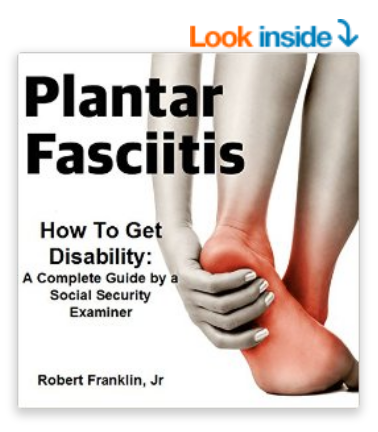I am a former claims examiner for social security who has reviewed many cases which alleged disability due to plantar fasciits.
Plantar fasciits is one of the most common causes of foot/heel pain. It causes
an intense pain that often occurs when taking your first steps in the morning and can last all day. There are medications which doctors prescribe which may provide some relief but often the pain continues. Also, some medications may cause serious side effects.
One or both feet may be involved. It occurs in both men and women, but usually affects men and is often seen in those who are overweight, runners and individuals standing on their feet a great part of the day. Also, those who wear shoes with inadequate support are suspectible. However, many cases occur without a specific reason.
It is caused by an inflammation of the thick band of tissue called the plantar fascia which runs across the the bottom of the foot connecting the heel bone to the toes. On examination there is usually tenderness on pressure over the bottom of the foot and heel. There may also be evidence of flat feet or high arches. X-rays are negative unless other abnormalities appear such as evidence of arthritis or a bone spur.
To obtain an application, you can visit the local social security office or phone. The form is entitled 3368. On this form you state the reasons for disability and the date they began. The toll-free number is 1-800-772-1213. You can also apply online at www.socialsecurity.gov.
There are several types of treatment which may partially help reduce the pain including heel cushions, custom arch supports and shoe modifications. If pain continues and significantly interferes with your ability to work a normal day, then you should consider applying for social security disability benefits. Applying for disability takes a considerable amount of time and can be quite frustrating. Numerous medical records must be obtained from your treating doctors and reviewed by specialists at the disability office. Therefore, one should strongly consider seeking the services of an attorney who specializes in such cases from the start. He can assist you in understanding the process and improve your chances of success as well as shorten the time for a decision.
Individuals at the state agency will review your entire medical record and decide whether you are allowed or denied benefits. Your age and past working history are taken into consideration as well as your level of education.
Basically, what the state wishes to know in exact hours is how limited are you in terms of how long you can stand and walk over a normal working day. As an example, can you stand and walk 6 out of 8 hours or are you limited to 2 out of 8 hours or severely limited to significantly under 2 out of 8 hours. From your treating doctor’s medical records, the state will make a decision regarding the number of hours you can reasonably be expected to stand and walk over an 8 hour period. If you are denied, you can reapply. If you are still denied, you can request a judge called an ALJ to review your case and make a decision. Your attorney can be present at that time and assist you in presenting your case. Your chances of success are improved if your ability to walk over a working day is significantly limited.. An example would be less than 2 out of 8 hours. However, your age can make a big difference.. If you are over 55 years of age, you probably would not need to be so limited and still be allowed benefits. Social security also considers your age and past work history when making a decision. In addition, the state requires that your impairment must last 12 consecutive months. This is important to know since your walking may be quite limited at the beginning of your problem, but by 12 months you may have improved considerably and therefore be denied benefits.
You should ask your doctor to give his opinion by letter as to how your ability to walk over a normal day is affected by pain; that is, the number of hours you can stand and walk over a normal working day. The less hours you are able to walk the greater your chances for getting disability. Often, the state will give considerable weight regarding his medical judgement.
As I stated previously it is extremely important that you seek the services of a good attorney who has been engaged in disability cases for a number of years.
